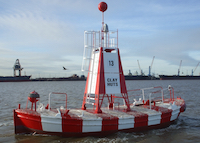Make an enquiry
Why choose us
-
Worldwide on-site delivery available
-
Lloyds Register Approved Training Provider for LPS courses
FAQ SECTION
Find Answers »
Frequently Asked Questions (FAQ)
Q: What are the prerequisites (qualifications etc.) for VTS Operators (VTSO) both with and without a marine background? Q: What do new VTS candidates without a marine background or VTS experience need prior to commencing VTS V103/1 training? Q: Upon completion of the Nautical Knowledge module can non-marine background students continue on to the V103/1 course? Q: Does AFS have appropriate courses/modules for delivery of VTS courses? Q: Do AFS trainers have the relevant VTS qualifications and recognised experience? Q: Do AFS issue certificates for V103 training bearing the IALA logo? Q: What is the recommended duration for V103/1 training for new VTSO candidates? Q: Do AFS conduct V103/3 VTS training for newly qualified Operators? Please state duration and what pre-requisites are required? Q: Do AFS conduct VTS 'On the Job Trainer' courses? Q: Where does AFS normally conduct its VTS training courses? At customer's premises or at a UK facility? Q: What recommendations do AFS suggest for VTSO's who are weak in English communications (conversational, understanding and written)?
What are the prerequisites (qualifications etc.) for VTS Operators both with and without a marine background?
Candidates with a recognised marine qualification (STCW OOW, or higher) only need to prove they have IELTS level 5 in English. Those without a recognised marine qualification (as above) require additional nautical knowledge training (module 4 in the IALA V103/1 model course) for a minimum period of 5 days (actual duration is dependent upon experience and background). The contracting Client is responsible for checking that all pre-course requirements have been met, although AFS Consultants can assist in this regard.
What do new VTS candidates without a marine background or VTS experience need prior to commencing VTS V103/1 training?
In addition to module 4 (Nautical Knowledge) IALA require sufficient competence in Radar (Module 3) and VHF Radio (Module 6). These are usually gained by completing recognised Radar/ARPA and GMDSS courses respectively. Such courses can usually be obtained at any local college or training institute offering marine courses.
Upon completion of the Nautical Knowledge module can non-marine background students continue on to the V103/1 course?
Yes, if they have been successful in the Module 4 Nautical Knowledge (NK) examination and have satisfied the other requirements for Radar/ARPA and GMDSS. On completion of this Nautical Knowledge element the candidate is then eligible to proceed to the 10 day V103/1 VTS Operators course.
Does AFS have appropriate courses/modules for delivery of VTS courses?
Yes. AFS has IALA standard model courses ready to deliver for V103/1(Operator), V103/2 (Supervisor) and V103/4 (OJTI). These include presentations, course booklets, simulation exercises, scheme of work and lesson plans.
Do AFS trainers have the relevant VTS qualifications and recognised experience?
Yes. As sole providers of VTS training at the 2 accredited VTS Maritime Colleges in the UK, our trainers have met the UK MCA criteria which is verified by audit. All AFS trainers hold marine, VTS and teaching qualifications. However, the UK MCA do not accredit individuals or companies.
Do AFS issue certificates for V103 training bearing the IALA logo?
No, we use our own logo and that of Lloyds Register. To enable the IALA logo to appear on a VTS certificate the National Competent Authority for VTS in each country (example: in the UK it's the Maritime and Coastguard Agency - MCA) has to accredit the training facility and the courses. In relation to certification, it is the training institute/organisation that issues the appropriate certificate on successful completion of a course (i.e. the college or training institution). The certificate issued is only valid for courses delivered at those facilities, as they have been duly audited by the appropriate National Competent Authority. It is also required that each competent authority must be a member of IALA. AFS Consultants issue certificates for courses delivered elsewhere (other than at the colleges) and the certificates state that the course meets the internationally recognised IALA Model Course standard. Our certificates are also stamped with the 'Lloyd's Register Approved Training Provider' logo.
What is the recommended duration for V103/1 training for new VTSO candidates?
The IALA V103/1 Model Course for all candidates is usually 5 days (35 hours) of classroom work followed by 5 days (35 hours) of simulation exercises.
Do AFS conduct V103/3 (On the Job) VTS training for newly qualified Operators? What is the state duration and what pre-requisites are required?
Yes. This is the 'on the job training' (V103/3) element of VTS training. AFS do provide this training, but its duration will depend on the candidates own ability and the complexities of the VTS area involved. Ideally, candidates selected for this training should already be in possession of a V103/1 VTS Operator certificate. Any certification is normally issued by the candidates own VTS Authourity (Station), since they will have then met the stations criteria for the award of an On the Job certificate (under the guidance of AFS).
Do AFS conduct VTS 'On the Job Trainer' (OJTI) courses?
Yes. This is known as IALA Model Course V103/4. It is not a qualification to enable an individual to conduct V103 VTS training, but specifically to facilitate 'in house' on the job training at the candidate's own VTS centre. AFS can deliver this course, which is of 3 days duration.
Where does AFS normally conduct their VTS training courses?
All of our courses can be (and have been) conducted both at UK colleges and at clients own premises. We also have arrangements to deliver VTS Training with IALA accredited training establishments in U.A.E and Brazil.
What recommendations do AFS suggest for VTSO's who are weak in English communications (conversational, understanding and written)?
The IELTS level 5 is a minimum IALA requirement. Additional English lessons should be taken at a local college or training facility prior to entry onto the V103/1 course to ensure compliance with this IALA requirement.
We are proud to have associations with the following:-






